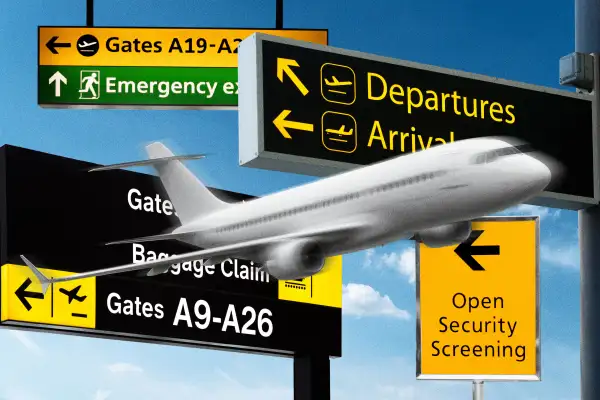Flight Canceled by FAA Cuts? Here's What to Do Next

Federal Aviation Administration-imposed flight cancellations have begun, and travelers are feeling the pain. An FAA directive to reduce strain on air traffic controllers, who are working without pay due to the government shutdown, led to some 800 flights being canceled as of Friday morning.
Airlines are scrambling to comply with U.S. Transportation Secretary Sean Duffy’s Wednesday announcement that 40 of the nation’s biggest airports will be required to slash 10% of their flights by next week.
Taking a phased-in approach, the FAA ordered airlines to reduce 4% of their capacity on Friday, 5% on Saturday and 6% Sunday, Reuters reported Thursday. On Friday, Duffy said it was "possible" that the administration could increase mandated cancellations to 20%.
While nominally targeting only big airports like those serving Chicago, Atlanta, New York City and other major air travel hubs (see the full list here), the complexity of airlines’ route maps and schedules means that ripple effects will be felt throughout the system, industry experts warn.
"The unfortunate outcome in this case is the traveling public is held hostage," says airline industry consultant Robert W. Mann. "Since it's ostensibly aimed at air traffic control staffing and operations, it's typically the 40 busiest terminal areas but… from a customer's perspective, it's what markets are affected that matters. And that’s a much broader swath of cuts than just 40 cities."
According to travel site Hopper, canceling 10% of flights from the 40 busiest airports over the next week alone would impact more than 13,300 flights, and upwards of 1.5 million seats.
Part of that is a function of the legacy carriers' route structures. Three of the four biggest domestic airlines — American, Delta and United — use hub-and-spoke systems that require being able to rotate aircraft and crews through multiple cities.
The outlier is Southwest, along with low-fare carriers like Frontier and Allegiant. These airlines have more point-to-point flights that depart from and return to the same airport. However, rebooking on a low-fare airline can be more challenging, since many of these airlines save money by only running routes a few times a week.
If you have to fly within the next week or so, you've got options, experts say — just not great ones. Here’s what you need to know.
Don't assume travel insurance will cover you
This situation has been a boon for sales of travel insurance. One online platform saw sales of travel insurance policies jump by 8%, according to CNBC.
But buying travel insurance now might not give you the coverage you need, experts caution. "If you booked after the shutdown began, that’s what’s known as a 'known event,'" says Henry H. Harteveldt, travel industry analyst and president of Atmosphere Research Group. While it's highly unusual for the FAA to impose restrictions on flights, you would need to parse the policy's fine print to determine if you would be covered.
Policies that let you cancel for any reason might have more flexible terms, but this type of travel insurance costs more, and payouts can be limited. If you have a travel credit card, you might already have coverage for some unanticipated expenses.
Consider sitting this one out
If you don't have to travel, staying out of airports might be your best bet, experts say. Most of the U.S.-based airlines have announced that they will waive cancellation and change fees for people flying within the next week or so.
The waiver period end dates differ by airline, so check with your carrier to find out if you have the option to get a refund or rebook. In some cases, waivers are being granted to travelers booked on certain routes or through certain cities; some are extending blanket waivers to most or all domestic passengers.
This isn’t mere generosity on their part, Harteveldt says. With fewer planes in the air, airlines are trying to give themselves a little breathing room by freeing up seats they can assign to other passengers who need to be rebooked from canceled flights.
“Airlines are offering complete refunds even if your flight is not canceled,” he says. “They want to free up as many seats as they can for people who need to travel."
Know (and assert) your rights
"This is pretty unprecedented," says Paul Hudson, president of consumer advocacy group FlyersRights. Unfortunately for travelers, this means the outcome of most disruptions will be dictated by the airlines' individual policies. He suggests that travelers consult the Department of Transportation’s dashboard, which details each domestic airline’s policy for cancellations and delays.
If an airline cancels your flight, you're legally entitled to a refund — even if the carrier rebooks you on a later flight. Be prepared to advocate for yourself, analysts warn.
This is especially pertinent if you paid more for an upgraded flight experience like a business-class or exit-row seat with extra legroom. “If you purchased an optional product like priority boarding that you're unable to use, the airline should give you an automatic refund, but it’s possible these could slip through the cracks,” Harteveldt says.
If you're rebooked, this also holds true, he adds. “If you’ve paid for any optional products, you need to double-check that those transfer with you."
Stay up to date on the news
"If you’re scheduled to travel during the next week, you need to pay close attention to your reservation," Harteveldt says. Give the airline multiple ways to update you with news about your flight. Download the carrier's mobile app, and make sure the airline has your email and mobile phone number. If you’re flying on an aircraft operated under a code-sharing agreement, download the app of the operating airline, as well.
Don't forget to monitor your departure airport for information about how much time to give yourself to get through security. Absenteeism among TSA employees has led to hours-long lines at some airports, and missing your flight because you were stuck in a security line doesn’t entitle you to a refund or rescheduled flight.
If you have to purchase a ticket for a flight within a week or two, there are a few things you can do to mitigate an expensive disruption. Book direct flights rather than take your chances with a layover, and fly early in the day, because delays pile up over time.
This can also help you avoid what Hudson calls the “nightmare” scenario of being stranded in a layover airport for hours or even days.
Buy your ticket directly with the airline rather than a third-party site, Hudson advises. “At this point, I would avoid third-party booking sites, because if you have problems, they're not going to be in a position to help you as much as the airline,” he says.
A more drastic measure recommended by some travel experts — and one airline CEO — is booking a refundable ticket on a different airline as a backup. Just be aware of the window of time you have to cancel so you can get your money back if your original flight departs as planned.
More from Money:
How Much Are Airline Rewards Really Worth? Biden Admin Probes Credit Card Program
Airfare Is Cheaper This Summer. Here's How to Save on Your Next Trip





